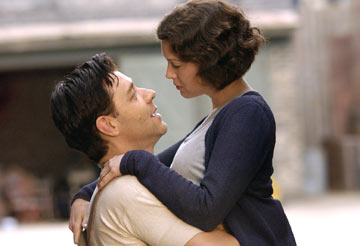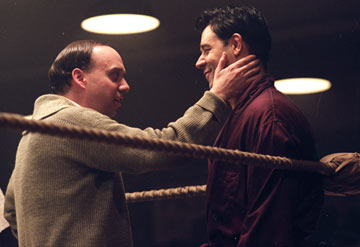

Some movies just feel like they were made for awards. That does not necessarily mean they deserve them (cough, Cold Mountain, cough). Cinderella Man is one of those movies. It has Oscar-winning stars (Russell Crowe and Renee Zellweger, and Paul Giamatti, who by all means should have one), an Oscar-winning director (Ron Howard), and a triumphant historical story about a man overcoming his troubles and winning. While everything is inspiring, Cinderella Man feels a bit forced. Every movie tries to manipulate the emotions of the viewer. In good movies, while everybody watching knows this is happening, the filmmakers somehow manage to sneak it by the audience. In Cinderella Man, the audience knows exactly what Howard (The Missing, A Beautiful Mind) and screenwriters Cliff Hollingsworth (Too Good to Be True) and Akiva Goldsman (I, Robot, A Beautiful Mind) is trying to do.
They are telling the story of boxer Jim Braddock (Crowe, Master and Commander, A Beautiful Mind), who, long after his prime, returned to prominence. People came to admire Braddock as a hero. His rise to fame happened at the Great Depression, and everybody believed that if he could do it, they could too. Howard spends the first hour 'breaking' Braddock. He's at the tail end of his career, battling multiple injuries. Boxing is the only way to make money, since there are too many people looking for work at the docks. Braddock's manager Joe Gould (Giamatti, Robots, Sideways) tries to get him fights, but it becomes harder. He is eventually kicked out by the boxing commission. In the meantime, the Depression worsens, and Jim and his wife Mae (Zellweger, Bridget Jones: The Edge of Reason, Shark Tale) seriously think about giving up their chidren temporarily to give them a better life.
The antagonist of Cinderella Man is boxer Max Baer (Craig Bierko, Dickie Roberts, Kate & Leopold). He is a fierce boxer who killed two men in the ring. Bierko portrays him as a preening, arrogant man who toys with his opponents. Gould gets Braddock into a fight mostly because of the novelty factor, and against all expectations, Braddock wins. He fights again, and wins again. Braddock wins because he is using the winnings to do things like turn on his electricity. He is fighting to survive, and the population at this point in time identifies with this. His winning streak brings him straight into the sights of Baer, who has little desire of boxing an old man. Braddock is adamant, and given Baer's history, Mae is worried.
This is an interesting role for Crowe. It has a lot more tender nuances than most of his other roles. Braddock has children, and cares for them deeply. Not only does Crowe need to be an aging attack dog in the ring, but he must shift emotions after the fight and care for his wife and children. Zellweger's role doesn't require much, and she's a little better than average (no offense, but she's simply not as good as many people think), and the normally great Giamatti is stuck as the stereotypical boxing coach. Most of the characters are simple archetypes, and aside from Braddock, the lack of substantial depth is one of the major factors why Cinderella Man isn't a great movie, yet because of quality of most of the movies released thus far, it is one of the better ones so far this year. It moves like most other boxing films and ends exactly the way one would expect. Otherwise, why would Howard make the film in the first place?